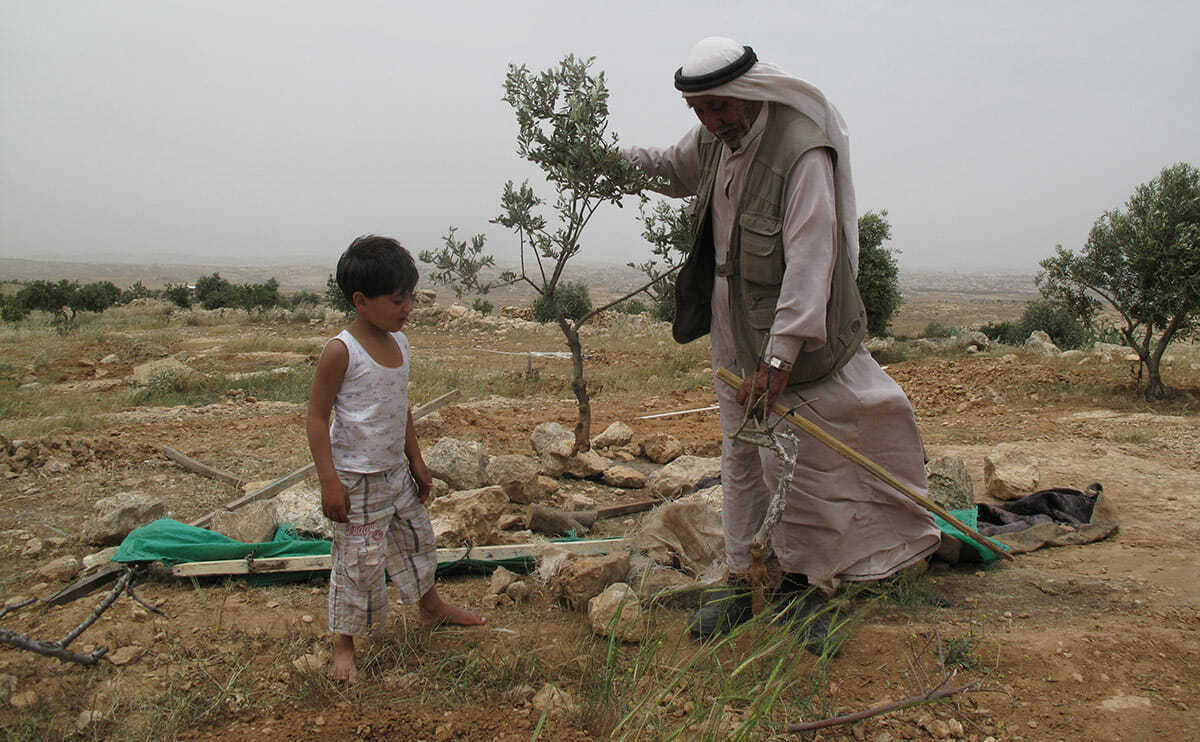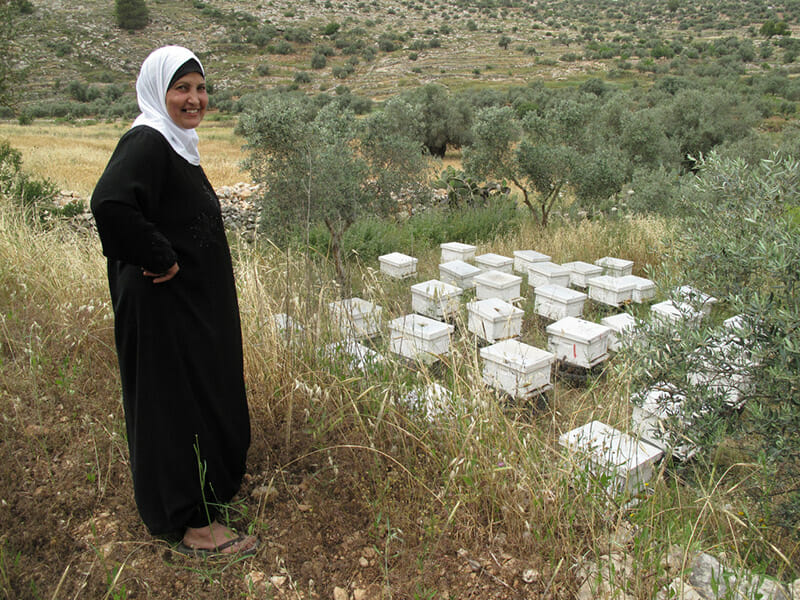A Tree Grows in Gaza
The olive branch, a universal symbol of peace, has become yet another source of Israeli-Palestinian conflict.
A Tree Grows in Gaza
The olive branch, a universal symbol of peace, has become yet another source of Israeli-Palestinian conflict.

In the West Bank and Gaza, almost half of the arable land is planted with olive trees, from saplings to some that have produced fruit for a thousand years. Nearly 80,000 Palestinian families depend on the annual fall olive harvest for their livelihood. But in recent decades, the conflict in the region, which recently flared up once again, has taken a devastating toll: Israeli settlers and military personnel have cut down, uprooted and burned an estimated 800,000 olive trees since 1967, including approximately 49,000 in just the past five years, according to the UN Office for the Coordination of Humanitarian Affairs.
The Union of Agricultural Work Committees of Palestine (UAWC) wants to turn this dire situation around. Ali Hassouneh, the group’s board chair, believes that the olive groves represent a shared inheritance. “If I have an olive tree that is 1,500 years old, I think: Who planted it? How many thousands of people have eaten from it? The trees are our heritage ”“ my heritage and [the Israelis’], too.” The UAWC, one of the oldest Palestinian NGOs, has worked with farmers in the West Bank and Gaza on water and land access since 1986. It also provides annual support with the olive harvest.
The walls separating the West Bank and Gaza from Israel cut through many Palestinian farms, separating families from their orchards and grazing lands. Farmers cannot cross the wall regularly to tend their trees and other crops; they must apply for a special permit for the olive harvest. According to the UN, as many as 42 percent of these permit requests have been denied in recent years. Those who do get a permit often face harassment and violence, and they sometimes arrive only to find their trees destroyed.
The UAWC brings hundreds of local and international volunteers to provide labor, solidarity and protection for the harvest, as they say that the presence of volunteers reduces violence.
If I have an olive tree that is 1,500 years old, how many thousands of people have eaten from it?’
Construction on the West Bank wall began in 2002, a year in which 47 suicide bombings targeted Israeli citizens. In that context, writes Colonel Danny Tirza of the Israeli Defense Forces, the wall’s chief architect, “The security fence was an essential defensive move taken by the Israeli government in order to protect its citizens,” and indeed, suicide bombings and other attacks on Israelis have fallen dramatically since construction of the wall and concurrent developments such as a Hamas ceasefire.
But in the Palestinian territories, where unemployment can run as high as 40 percent, Palestinian farmers’ olive trees are a vital source of income and food. And those aren’t the only benefits. “Agriculture is a tool of resistance, of independence … of freedom. If you have your food, even if you’re poor, you can survive,” says Hassouneh.
The UAWC was built on this philosophy. Originally an informal coordinating body for agricultural workgroups in communities throughout the territories, the union formalized just before the first Palestinian intifada – or uprising – in 1987. The group began promoting self-sufficiency: distributing seeds, helping Palestinians to plant gardens and developing farmland. Hassouneh says that UAWC members – himself included – were sent to jail for these activities, but home gardens and urban agriculture helped Palestinians to survive the strict blockades and curfews of the period.
More than 25 years later, although as many as 90 percent of Palestinians are economically involved in agriculture, the sector is struggling. According to a 2012 UN report, “The [Palestinian] economy has lost access to 40 percent of West Bank land, 82 percent of its ground water, and more than two thirds of its grazing land. In Gaza, half of the cultivable area … [is] inaccessible.” The UAWC has its work cut out for it.

The group supplies goods such as feed at cost and provides technical assistance for projects such as rainwater collection or constructing livestock shelters. The union coordinates several women’s cooperatives focused on farming, textiles and food products, where the women learn critical marketing and business skills that allow them to enter the work force. Female unemployment in the territories was almost 35 percent in 2013; projects like a successful beekeeping cooperative in the West Bank allow women to support their families and gain economic independence from their husbands.
The group is continuously adapting to meet the needs of farmers. In 2003, the union learned that the very seeds on which their members depended were at risk – the local seed varieties, bred over centuries, were disappearing due to both poor weather conditions and pressure on farmers from seed companies to buy modified seeds. The UAWC began a seed improvement program and opened a seed bank in 2009. The bank, only the second of its kind in the Middle East, is actively engaged in research as well as preservation, using pollination and grafting to further improve varieties for the local environment. It provides several hundred families with seed every season, with the condition that they return a portion of their seeds to the bank after harvest.
The UN recognized the seed bank this year with the Equator Prize for local sustainable development, and the UAWC was awarded the Food Sovereignty Prize last month. Food sovereignty is not just about having enough to eat, but also about having control over food and farming policies and practices. It’s not just about survival, but also self-determination.
In the spirit of self-determination, many Palestinian farmers keep replanting their olive trees. Hassouneh tells a story about visiting farmers near Hebron, where there are almost no roads, water or electricity. “The farmers suffer the most from occupation,” he says. “But they are hard at work planting and taking care of their land.” Given high unemployment, poverty and lack of control over land and water, for Palestinians, “The importance of agriculture is not how much it contributes to GDP or how many people it employs. The importance is this: if you live in a village and you have a tree, you are not hungry. You can live.”
Follow us
This work is licensed under a Creative Commons Attribution-NoDerivatives 4.0 International License.
Want to republish a Modern Farmer story?
We are happy for Modern Farmer stories to be shared, and encourage you to republish our articles for your audience. When doing so, we ask that you follow these guidelines:
Please credit us and our writers
For the author byline, please use “Author Name, Modern Farmer.” At the top of our stories, if on the web, please include this text and link: “This story was originally published by Modern Farmer.”
Please make sure to include a link back to either our home page or the article URL.
At the bottom of the story, please include the following text:
“Modern Farmer is a nonprofit initiative dedicated to raising awareness and catalyzing action at the intersection of food, agriculture, and society. Read more at <link>Modern Farmer</link>.”
Use our widget
We’d like to be able to track our stories, so we ask that if you republish our content, you do so using our widget (located on the left hand side of the article). The HTML code has a built-in tracker that tells us the data and domain where the story was published, as well as view counts.
Check the image requirements
It’s your responsibility to confirm you're licensed to republish images in our articles. Some images, such as those from commercial providers, don't allow their images to be republished without permission or payment. Copyright terms are generally listed in the image caption and attribution. You are welcome to omit our images or substitute with your own. Charts and interactive graphics follow the same rules.
Don’t change too much. Or, ask us first.
Articles must be republished in their entirety. It’s okay to change references to time (“today” to “yesterday”) or location (“Iowa City, IA” to “here”). But please keep everything else the same.
If you feel strongly that a more material edit needs to be made, get in touch with us at [email protected]. We’re happy to discuss it with the original author, but we must have prior approval for changes before publication.
Special cases
Extracts. You may run the first few lines or paragraphs of the article and then say: “Read the full article at Modern Farmer” with a link back to the original article.
Quotes. You may quote authors provided you include a link back to the article URL.
Translations. These require writer approval. To inquire about translation of a Modern Farmer article, contact us at [email protected]
Signed consent / copyright release forms. These are not required, provided you are following these guidelines.
Print. Articles can be republished in print under these same rules, with the exception that you do not need to include the links.
Tag us
When sharing the story on social media, please tag us using the following: - Twitter (@ModFarm) - Facebook (@ModernFarmerMedia) - Instagram (@modfarm)
Use our content respectfully
Modern Farmer is a nonprofit and as such we share our content for free and in good faith in order to reach new audiences. Respectfully,
No selling ads against our stories. It’s okay to put our stories on pages with ads.
Don’t republish our material wholesale, or automatically; you need to select stories to be republished individually.
You have no rights to sell, license, syndicate, or otherwise represent yourself as the authorized owner of our material to any third parties. This means that you cannot actively publish or submit our work for syndication to third party platforms or apps like Apple News or Google News. We understand that publishers cannot fully control when certain third parties automatically summarize or crawl content from publishers’ own sites.
Keep in touch
We want to hear from you if you love Modern Farmer content, have a collaboration idea, or anything else to share. As a nonprofit outlet, we work in service of our community and are always open to comments, feedback, and ideas. Contact us at [email protected].by Siena Chrisman, Modern Farmer
December 5, 2014
Modern Farmer Weekly
Solutions Hub
Innovations, ideas and inspiration. Actionable solutions for a resilient food system.
ExploreExplore other topics
Share With Us
We want to hear from Modern Farmer readers who have thoughtful commentary, actionable solutions, or helpful ideas to share.
SubmitNecessary cookies are absolutely essential for the website to function properly. This category only includes cookies that ensures basic functionalities and security features of the website. These cookies do not store any personal information.
Any cookies that may not be particularly necessary for the website to function and are used specifically to collect user personal data via analytics, ads, other embedded contents are termed as non-necessary cookies.